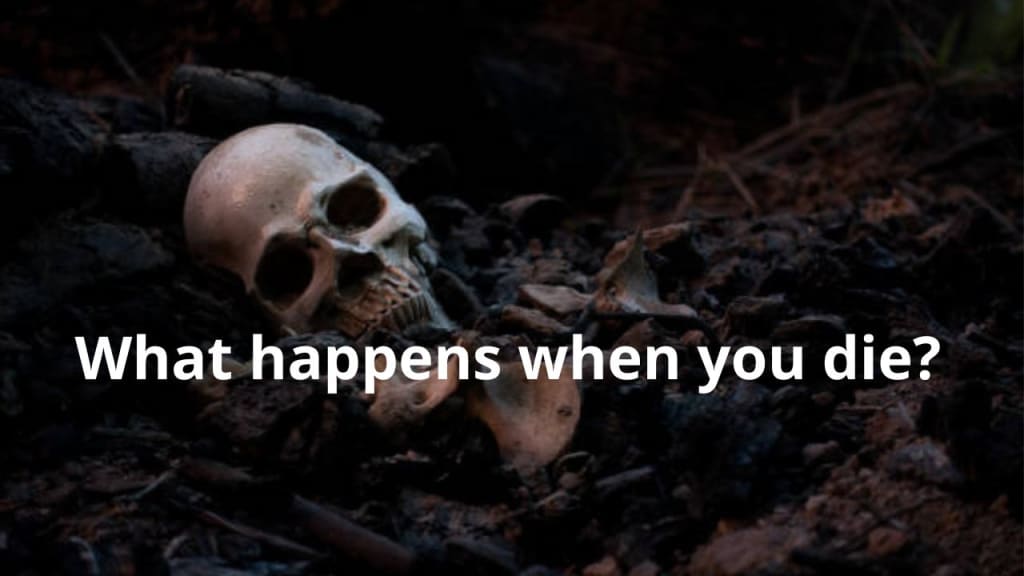
Introduction
The concept of what happens after we die has intrigued and puzzled humanity for centuries. It is a topic that has fueled religious beliefs, philosophical debates, and scientific inquiries. While we cannot provide a definitive answer to this profound question, we can explore the various perspectives and theories that attempt to shed light on the mystery of what occurs after death.
When a person dies, a series of physiological changes occur within the human body. These changes are part of the natural process of death and are often categorized into several stages:
- Clinical Death: Clinical death occurs when the heart stops beating, and breathing ceases. This is typically the point at which medical professionals declare a person dead.
- Pallor Mortis: Pallor mortis, or the "paleness of death," sets in soon after clinical death. Blood circulation stops, and the body loses its color, appearing paler. This is particularly noticeable in the extremities and the face.
- Algor Mortis: Algor mortis refers to the cooling of the body after death. The body temperature gradually decreases, reaching room temperature over several hours.
- Rigor Mortis: Rigor mortis is the stiffening of muscles that occurs a few hours after death. It begins in the smaller muscles and spreads to the larger ones. Rigor mortis typically peaks at around 12 hours after death and then gradually dissipates over the following 48 hours.
- Livor Mortis: Livor mortis, or lividity, is the settling of blood in the lower parts of the body, causing a purplish discoloration of the skin. The exact pattern and color depend on the position of the body after death.
- Decomposition: Decomposition is the breakdown of body tissues by microorganisms and enzymes. It usually begins a few days after death and is characterized by the release of gases, the development of a distinctive odor, and the eventual breakdown of tissues.
These physiological changes occur as a result of the cessation of bodily functions, including circulation, respiration, and metabolic processes. The exact timeline and progression of these changes can vary depending on factors such as temperature, humidity, and the individual's health at the time of death.
It's important to note that while these changes are part of the natural process of death, the cultural and societal customs surrounding death can vary widely. Funeral practices, burial or cremation methods, and mourning rituals differ across different cultures and belief systems. Ultimately, the understanding of death is deeply intertwined with cultural, religious, and personal perspectives, and it remains one of the most profound and universal aspects of human existence.
Religious Beliefs
Many religious traditions offer distinct beliefs about the afterlife. For example, Christianity teaches that souls ascend to heaven or descend to hell based on their faith and deeds. Islam similarly teaches of a judgment day, where souls are rewarded or punished. Hinduism and Buddhism propose reincarnation, where the soul is reborn into a new body.
Spiritual and New Age Views
In contrast to organized religions, some individuals turn to spiritual or New Age perspectives. They believe in concepts like reincarnation, astral projection, or entering different realms of existence after death. These views often focus on the soul's journey and its connection to the universe.
Near-Death Experiences (NDEs)
Near-death experiences have been reported by individuals who have come close to dying but were revived. These experiences often include feelings of peace, seeing a bright light, or encountering deceased loved ones. NDEs have prompted some to believe in an existence beyond our physical realm.
Scientific and Atheistic Views
Scientifically, death is seen as the end of biological functions and consciousness. Atheists and agnostics often assert that there is no afterlife, emphasizing the importance of making the most of our time on Earth.
The Unanswered Question
The question of what happens when we die remains unanswered, and perhaps it is one of life's great mysteries. Some argue that the uncertainty adds depth and meaning to our existence, encouraging us to cherish the moments we have and make the world a better place.
Conclusion
The question of what happens when we die is a deeply personal and philosophical one, influenced by our cultural, religious, and spiritual beliefs. While we may never have concrete proof of an afterlife, the diversity of perspectives on this topic underscores the richness of human thought and our shared fascination with the mysteries of existence. Whether you find comfort in religious teachings, spiritual beliefs, or scientific explanations, the uncertainty of what awaits us after death invites us to ponder the profound nature of life itself.
About the Creator
Glitch
I write things






Comments
Glitch is not accepting comments at the moment
Want to show your support? Send them a one-off tip.